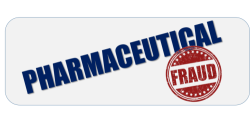The history of pharma fraud and the TGA
23rd Sept, 2021

The pharmaceutical industry has an appalling record of criminality including fraud and corruption, and yet our federal and state governments swiftly accepted the TGA's COVID-19 vaccine safety assessments for Pfizer and AstraZeneca, which were drawn from studies conducted by the vaccine manufacturers themselves! That's right, not one of the 'provisional approvals' was based on independent studies.
Our investigation into those TGA assessments also reveals that the TGA is heavily funded by the very companies that it ‘regulates.’ For instance, the Department of Health's annual report shows that TGA earnings from sale of goods and rendering of services totalled $168 million for 2020 (page 222).
Those TGA assessments lack independence and fall far short of 'stringent' or 'rigorous' by any reasonable measure.
IN USA: In 1988, legislation was passed in the USA, that no vaccine manufacturer shall be liable in a civil action for damages arising from a vaccine related injury or death associated with the administration of a vaccine that was properly constituted. This is because a US court found that vaccines are unavoidably unsafe.
IN AU: As noted in the 2020-2021 Budget papers, the Australian Government has provided an indemnity to AZ in respect of injury caused by their COVID vaccine. So can we assume that an indemnity has also been granted to Pfizer and Moderna? This may mean that no matter how severe some vaccine related injuries are, they cannot be litigated. Compensation of sorts may be available from the Australian Government.
This begs the question: How can our government dare to coerce the Australian population into taking medication based on such conflicted and abysmal standards? Especially now that children, who are at low risk of developing COVID-19, are targeted.
Looking into the fraud...
PFIZER (and their acquired/parent companies)
Since 2000, Pfizer was convicted of 75 offences at a total penalty of $10,193,896,333
Just to name a few:
- In 2014, Pfizer/Wyeth unlawfully promoted certain postmenopausal hormone therapy medications and misled Nevada consumers and physicians about the safety and efficacy of those drugs. Case details.
- In 2013, Wyeth unlawfully marketed the prescription drug Rapamune for uses not approved as safe and effective by the U.S. FDA. Case details. In addition, there were civil and criminal allegations for its uses that were not approved by the U.S. FDA. Case details.
- In 2012, Pfizer unlawfully promoted its drugs Zyvox and Lyrica. “Pfizer’s claims about Zyvox and Lyrica were not supported by scientific evidence”. Case details.
- In 2012, Pfizer’s subsidiaries bribed doctors and other health care professionals employed by foreign governments in order to win business. Case details.
- In 2012, Pfizer was using unreliable and unsubstantiated claims to promote Zyvox. Lacking evidence required by the FDA to make such claims, Pfizer allegedly relied instead upon flawed clinical studies to substantiate assertions that Zyvox was superior to Vancomycin. Case details.
- In 2011, Alpharma paid health care providers to induce them to promote or prescribe Kadian, and made misrepresentations about the safety and efficacy of the drug. The FDA had not approved the drug as safe and effective. Case details plus another case.
- In 2009, Pfizer promoted the sale of Bextra for several uses and dosages that the FDA specifically declined to approve due to safety concerns. The company was ordered to pay $1.195 billion, the largest criminal fine ever imposed in the United States for any matter. Case details. In addition, "Pfizer's misleading claims and deceptive actions put consumers' health at risk". Case details.
- In 2004, Warner-Lambert illegally and fraudulently promoted unapproved uses for one of its drug products, Neurontin. Case details, plus another case.
- In 2002, Pfizer fraudulently avoided paying in full the rebates owed to state and federal governments under the national drug Medicaid Rebate program for the cholesterol-lowering drug Lipitor. Case details.
- In 2000, Parke-Davis/Warner Lambert's drug Rezulin was recalled after at least 90 liver failures and at least 63 deaths, resulting in 35.000 personal injury claims filed against Pfizer. Details.
- In 1996, Pfizer failed to obtain proper consent for trialling a meningitis drug on 200 children in Nigeria. Eleven died and the drug was eventually prohibited for meningitis because it had a risk of complications. Article.
ASTRA ZENECA
Since 2000, AZ was convicted of 26 offences at a total penalty of $1,381,343,497
Again, just a few:
- AZ will pay $520 million to resolve allegations that they illegally marketed the anti-psychotic drug Seroquel for uses not approved as safe and effective by the FDA. Case details. In addition, they failed to adequately disclose potential side effects to health care providers, and withheld scientific studies that called into question the drug’s safety and efficacy. Case details.
- AZ allegedly promoted its powerful and potentially dangerous drugs Seroquel and Crestor to Texas Medicaid providers, who primarily treated children and adolescents when those drugs were not approved as safe and effective for use in that vulnerable population. Case details.
- AZ did not provide adequate FCPA training to its sales and marketing employees in China and Russia who had routine interactions with government officials in the healthcare industry, which thereby posed a high risk for bribery and corruption. Case details.
